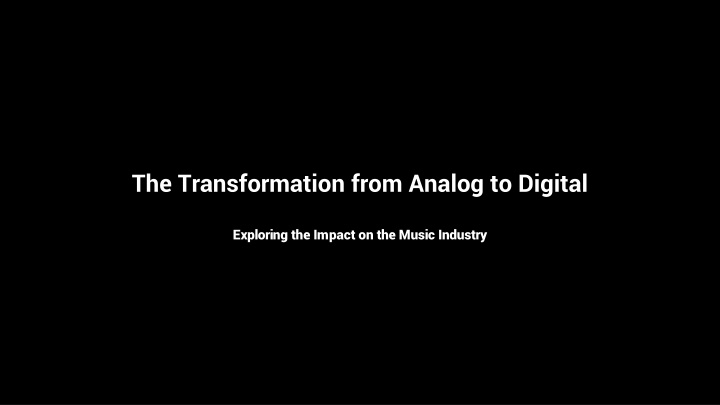
Impact of Analog to Digital Transformation on Music Industry
Explore the profound impact of the analog to digital transformation on the music industry, including changes in revenue streams, rise of streaming platforms, challenges for musicians, and opportunities for artists in the digital age.
Download Presentation

Please find below an Image/Link to download the presentation.
The content on the website is provided AS IS for your information and personal use only. It may not be sold, licensed, or shared on other websites without obtaining consent from the author. If you encounter any issues during the download, it is possible that the publisher has removed the file from their server.
You are allowed to download the files provided on this website for personal or commercial use, subject to the condition that they are used lawfully. All files are the property of their respective owners.
The content on the website is provided AS IS for your information and personal use only. It may not be sold, licensed, or shared on other websites without obtaining consent from the author.
E N D
Presentation Transcript
The Transformation from Analog to Digital Exploring the Impact on the Music Industry
Introduction The shift from analog to digital has had a profound impact on the music industry. Advancements in technology have transformed transformed the way music is created, distributed, distributed, and consumed. This presentation will explore the various aspects aspects of this transformation and its consequences. consequences. We will discuss the changes in revenue streams, streams, the rise of streaming platforms, and the the challenges faced by musicians and songwriters. songwriters. Photo by Pexels Photo by Pexels
Digital Revolution: Music Streaming The advent of music streaming platforms has has revolutionized how consumers access and listen listen to music. Streaming services like Spotify, Apple Music, and Music, and Tidal dominate the industry, replacing replacing physical sales and digital downloads. downloads. Streaming offers convenience, accessibility, and personalization, but the revenue generated for artists and songwriters is significantly lower. Artists now heavily rely on streaming platforms for exposure and revenue, often through millions of streams. Photo by Pexels Photo by Pexels
Changing Revenue Streams The transition from analog to digital has dramatically changed revenue streams for artists and artists and songwriters. Traditional revenue sources like album sales and and radio play have declined, while streaming and and live performances have become crucial. Songwriters face challenges in receiving fair compensation for their work, especially with streaming royalties. Efforts, such as the American Music Fairness Act, aim to improve royalty rates and ensure fair compensation for creators. Photo by Pexels Photo by Pexels
The Power of Social Media and TikTok Social media platforms, particularly TikTok, have become powerful tools for music discovery and viral success. TikTok's algorithm-driven content curation has propelled songs and artists to unprecedented popularity. Artists can gain widespread exposure and potentially secure record deals through viral TikTok videos. Music industry professionals are actively monitoring TikTok for potential talents and trends. Photo by Pexels Photo by Pexels
Challenges and Opportunities While the digital transformation has presented challenges, it has also created new opportunities for musicians and songwriters. Independent artists can now leverage digital platforms to reach a global audience without traditional label support. The shift to digital has increased access to music creation and production tools, empowering DIY musicians. Collaboration and licensing opportunities have expanded, making it easier to connect with other artists and monetize music through sync placements. Photo by Pexels Photo by Pexels
Conclusion The transformation from analog to digital has significantly impacted the music industry. While revenue streams have shifted and challenges have arisen, new opportunities for artists and songwriters have emerged. Adapting to the digital landscape is crucial for success in the modern music industry. As technology continues to evolve, it is essential for industry professionals to embrace innovation and leverage digital platforms to thrive. Photo by Pexels Photo by Pexels
